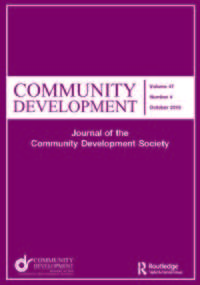 The principles and practices of collective impact apply especially well to issues facing community development practitioners because they help set up an implementation system, something that is needed in addressing local concerns. I’m happy to share about a new special issue of the journal Community Development that explores in greater detail how collective impact has been used in community development applications. This issue was coedited by Liz Weaver, Catherine McGuire and I, and published by Taylor and Francis in May 2016.
The principles and practices of collective impact apply especially well to issues facing community development practitioners because they help set up an implementation system, something that is needed in addressing local concerns. I’m happy to share about a new special issue of the journal Community Development that explores in greater detail how collective impact has been used in community development applications. This issue was coedited by Liz Weaver, Catherine McGuire and I, and published by Taylor and Francis in May 2016.
The special issue includes eight refereed articles plus a broad overview of the topics and applications to common community development issues and concerns. The articles were selected from an international solicitation that generated more than 50 abstracts from around the world. The articles are not “case studies”; rather, they are more research-focused with a clear methodology and generalizations for applications in other areas.
The special issue begins with an overview of collective impact tenets and how they are especially important in community development issues. Other topics address in the articles include discussions of ways to better incorporate local input and engage community residents in local decisions during the collective impact process based on research in New York. An examination of both contextual and procedural factors in collective impact applications using applications from federal programs that more and more are requiring a focus on collaboration in community development applications addresses the interplay between contextual and procedural factors is what drives successful collaboration.
Other articles re-examine the issue of executive privilege in communities and ways to make sure that views of minority or other sometimes overlooked groups are better brought into the community decision-making process. The ways that questions are raised or framed as well as the processes used in working with the community can affect the breadth of engagement as shown by studies described in several articles.
The articles conclude with a more in-depth discussion of how collective impact principles and practices can bring about transformational change. It focuses on system leadership, creating an effective framework for discussions, communicating and engaging residents, and then asking what is possible for the community. This article links earlier discussions in several ways.
This issue of Community Development is available from Routledge: Taylor and Francis Group at: http://www.tandfonline.com/toc/rcod20/47/2?nav=tocList
Call for Abstracts:
Liz Weaver and I are currently compiling an edited book-length manuscript that delves more deeply into successful applications of collective impact principles to local community development issues. The peer-reviewed chapters in this book will involve analyses of both the specific strengths and limitations of the collective impact principles or practices in applications. Are there examples when a project would not have worked without CI applications? What are some relatively unique CI applications that suggest other applications? The chapters will be research-based with a clear methodology and analyses that lead to generalizations, rather than simply a case study of an event in one place.
This compilation of chapters is currently underway and interested authors should submit a 300 word abstract to: Norman Walzer (nwalzer@niu.edu) before September 15th.
